He lived for them...
Click on most photos for larger images
From the "Daily Mail" 11/6/99 ~
The man who loved the Beatles
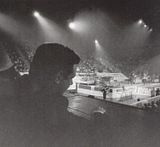 The irony is exquisite.
The irony is exquisite.It was Brian Epstein's very gayness
that helped to create the Beatles phenomenon.
In the process, he fell in love with them.
It was to prove a fatal attraction...
by Lesley Garner
At lunchtime on November 9, 1961, Brian Epstein left his successful record store in the centre of Liverpool and went, for the first time in his life, to the sweaty, seedy dive called the Cavern Club to hear a group called the Beatles.
He went, he saw and he fell instantly, deeply and irreversibly in love.
Brian Epstein was stylish and dapper, middle-class and affluent, Jewish and gay, with a liking for the roughest of rough trade. He was also consumed with a frustrated longing to break out of his Liverpool shopkeeping background into a glamorous, exciting, creative world. What he saw, in the words of his colleague, Alistair Taylor, who went to the Cavern with him, was a revelation.
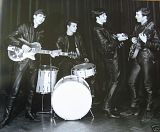 "There were these four guys on stage in black leather, wearing what we call bomber jackets today, black trousers, black T-shirts, and they were so loud.
"There were these four guys on stage in black leather, wearing what we call bomber jackets today, black trousers, black T-shirts, and they were so loud.
"There was smoking on stage, and they were joking with the girls in the audience, and it was just like 'Oh my God, what are we sitting here watching?' These guys were just so awful. It was quite appalling, really."
What Brian Epstein saw was rough trade with attitude, uncouthness with charm, sexual energy with raw talent.
He was hooked for life, and not just by John Lennon, though unconfirmed gossip has always held that he fell for John. But it wasn't John. It was all of them. He'd found the group he wanted to belong to, one glorious collective lover to whom all other lovers - and there were many - would always take second place.
His relationship with the Beatles was never sexual - gay sex was illegal then, and his own sexuality something he never discussed with them - but, as revealed in the accounts of friends and colleagues in a fascinating new book, The Brian Epstein Story by Debbie Geller, it was passionate, committed, protective, nurturing and faithful.
In return, the Beatles accepted, trusted and obeyed him. Between them they formed a partnership that made history. When Brian Epstein died, John Lennon said despairingly: "We've ******* had it now." And, in a way, they had.
"When Brian met the Beatles," said the writer Simon Napier-Bell, "something about them energised him. What he would have liked was to become a working-class boy with them. He knew he couldn't do that, so he had to turn them into something presentable to take home to his mother for tea."
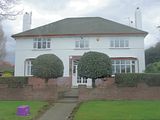 The home he would have taken them to was a warm and respectable middle-class Jewish home in Queen's Road, an affluent part of Liverpool, but it wasn't a milieu where Brian Epstein was at ease.
The home he would have taken them to was a warm and respectable middle-class Jewish home in Queen's Road, an affluent part of Liverpool, but it wasn't a milieu where Brian Epstein was at ease.
He'd failed at the Army and dropped out of RADA. He'd been prosecuted for soliciting for gay sex and his parents were only too relieved when he settled in to making a success out of the record department of the family store, NEMS. Whoever met him felt he was a cut above the rest, charming, stylish and refined, never quite belonging.
"I think he found it easier to create The Beatles than he did to reinvent himself," observed the Liverpool artist, Yankel Feather, "but then it would take an unhappy person, it would take somebody as mad as Brian, to accomplish what he did accomplish in the end.
"I mean, an ordinary person couldn't do it. If he had been a young married man with two children, would his wife have let him out to spend his time with four unruly boys? No, it couldn't have happened. For the Beatles to make it, they had to have somebody as strange as him."
What the Beatles saw, when he proposed that he would manage then, was someone more sophisticated, worldly wise than they and somebody who had an astonishing belief in their future. They were shrewd enough to know they needed him as badly as he wanted them.
"He was completely different from anyone in the Liverpool music scene," remembers Paul McCartney. "He had a bigger car than anyone we knew...a big Zephyr Zodiac.
"We had been playing together a little while and we were starting to feel that we were getting good, but there comes a point in everybody's career when you think you need a little bit more than just being good. We needed someone to manage that goodness, and push, and give us a few clues as to how we might go a bit further.
"It became obvious that Brian was that person. He had a theatrical flair. He knew a lot of people. So it became clear that he would be very good for us.
"The word was out that Brian was gay. The great thing for us was that it didn't really affect us in any way, although I think we suspected that he might hit on one of us.
"So I think in the early days we were slightly wondering whether that was his interest in us. But in my personal knowledge, that wasn't his interest."
Brian Epstein had already shown that he could completely separate his private and his business life. Homosexuality was only legalised shortly before his death, from an accidental overdose of sleeping pills, in August 1967.
The strain of risking prison, public exposure and blackmail for your sexuality kept homosexual activity hidden in a parallel universe. For Brian Epstein, with his taste for rough trade, that universe was often very dangerous.
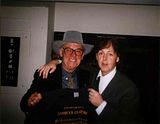 Joe Flannery, a Liverpool friend, remembers the two Brians very well. "He had to be the beautiful Brian, the well dressed Brian, but then he had to be somebody else. The Brian that I was with at the theatre, or the cinema, or going out fora drive wasn't the same person who could find himself in these tight squeezes.
Joe Flannery, a Liverpool friend, remembers the two Brians very well. "He had to be the beautiful Brian, the well dressed Brian, but then he had to be somebody else. The Brian that I was with at the theatre, or the cinema, or going out fora drive wasn't the same person who could find himself in these tight squeezes.
"One night, he left my house at about ten o'clock for wherever he was going. By about quarter to midnight he was back on my doorstep. He'd left my house in a beautiful white shirt...when he came back it was a brilliant red. He'd been knocked about so much that he didn't even come back in his car that night."
However, it was the fighter, the survivor in Brian Epstein that kept him travelling to London to see record companies and persisting doggedly after each rejection.
He believed so passionately in the Beatles and their amazing future that he never gave up, and this commitment, this sheer love, eventually communicated itself to George Martin, who became their legendary producer.
Brian was full of confidence for the Beatles. He had this unswerving devotion and faith in them, that they were brilliant and they were going to conquer the world. And, looking back on it, this was all the more remarkable because he'd been completely rejected by everybody.
"Of course, when I met them and saw them, worked with them, I got the same kind of feeling that he'd got. It was a kind of 'falling in love' business because they had this tremendous charisma, which nobody else seemed to have recognised, and I was puzzled by it. But there we are."
And there we all were. First, Brian Epstein fell in love with them, then George Martin, and then a whole generation round the world. But the Fab Four would never have been the Fab Four if they hadn't really been the Fab Five. There is no doubt in anyone's mind that Brian Epstein would have laid down his life for his boys.
He signed up other Liverpool acts - Cilla Black, Gerry And The Pacemakers - but for the rest he was just a manager. For the Beatles he was a necessary extension of themselves.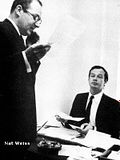
Nat Weiss, Brian Epstein's American business partner, noted shrewdly: "I don't think what the Beatles needed was a great businessman. They needed a person who could inspire them, whose neurosis was sufficient for him to identify with them.
"And, for Brian, the Beatles were an alter ego. Brian was on the stage with those Beatles emotionally, and he devoted his life to them."
His relationship with John Lennon was especially close. It has been suggested that they had a homosexual affair, but there is no proof of that. The bond was intellectual as much as emotional, or sexual.
John considered himself to be the group's leader and he realised that Brian identified more with him than any of the other three, and that he could control the situation through his influence over Brian. But all four of them accepted that what Brian said went, because it always worked.
"If anyone was the fifth Beatle, it was Brian," admits Paul McCartney. "If you're in a theatrical endeavour, the only way you can tell if you're doing good is if you have someone out there who says: 'That was really good. When you moved over, they lost you. Don't do that next time.'
"He was a director. That's really what he was."
Within three years of their meeting, the five of them were kings of the world, and Brian's empire had grown to include other Liverpool stars such as Cilla Black, Gerry And The Pacemakers and Billy J. Kramer.
George Martin remembers a mad whirlwind of success. "In 1963, I had 37 weeks in the No. 1 spot...and the Beatles were just a small part of that. All of these acts were Epstein acts.
"He then realised that he had the makings of a kind of latter-day Diaghilev. He saw himself as an impresario with a stable of great stars, and certainly it was a great kick-off to a career like that.
"Strategy wasn't a long-term job. Brian was developing in the same way the Beatles were, so he didn't know where he was going to end up."
No. 1 hits in Britain were great but they were only the first step in a plan for world domination. America came next, but Brian and the Beatles wanted America only on their terms, which was an American No. 1 before they set foot on American soil.
When they did set that first foot, thousands of fans were at the airport and America went wild. Brian had persuaded the American record company to spend $40,000 to promote the single I Want To Hold Your Hand, a piece of chutzpah which was unprecedented.
But he had the magic touch. Whatever he suggested was picked up. Even the Beatles were taken aback.
"We didn't expect that airport reaction," said Paul McCartney. "We were starting to think it might be big, but not as big as that. And we thought Brian was doing a great job for us."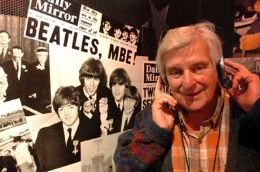
In 1965 Sid Bernstein, the American promoter, called Brian Epstein. "I said, 'Brian, would you be interested in doing Shea Stadium. It has 55,000 seats and we'll sell it out.' He said: 'You're on.' That showed his elegance, his class, his word - no contract."
The show at Shea Stadium made history. Nobody had ever done that kind of pop concert before, but after that there was no other kind.
And no matter how big the deal, how enormous the momentum, Brian Epstein continued to be the man that Sid Bernstein admired, the epitome of elegance and class. And these qualities, which had hooked the Beatles in the first place, were what they stilladmired.
The journalist Maureen Cleave said: "They rather like the fact that he has a Bentley and a Jaguar and a coloured manservant. They like the richness and the glamour that his life seems to have.
"They also like the fact that he talks differently from the way they do and the fact that he's well off anyway. They like this. They like the fact that he's used to wearing a dinner jacket. They think he's sort of different - a cut above."
He *was* a cut above and, as the global success accumulated, increasingly at heart a man apart, despite the glittering social life, the famous friends, the genuine love and respect of his boys.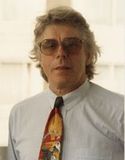
Derek Taylor, the Beatles' press officer, remembers that "At the height of it all in 1963/4/5 the waves did part as he came into a big throng. They would all peel back to let this man through.
"Brian Epstein was very, very famous. As close as I was to him, I would have spotted any self-aggrandisement but there was none. He would never, ever try to compete with the Beatles. You would call it sad today, his humility."
All his friends and colleagues remember Brian Epstein as a charming, funny man, but there was an insoluble sadness inherent in his position. He was in love with four people, but he could never really *be* them.
He could nourish, protect, build and care for them, but they couldn't do that for him in return. They found happiness in marriages and relationships, but he never did. At the end of the day he was alone, or 'cruising' for excitement, acceptance and sex with people who could never do him any good.
Sex, as opposed to love, was still found in his separate parallel world, a world whose inhabitants sometimes surfaced dangerously into the Epstein world of bespoke and decorated houses.
Strange people slept on the sofa. The furniture and fixtures were trashed. Possessions were stolen, but none of this was allowed to interfere with his care for 'his boys'.
The saddest thing of all was that any relationship could be wrecked by his closeness to the Beatles and his fear that he could never be loved for himself alone. As Nat Weiss says: "Brian was always concerned that someone only liked him for being Brian Epstein who, incidentally, was a very handsome, sharp, good looking person.
"I saw it happen many times. Brian would think the relationship was developing and then the person would say: 'Now, tell me what they're like, Brian, and when can I meet them?' That would terminate the relationship right then and there."
And there were drugs. The amphetamines started in the earliest days, simply to keep the energy up. Then there was marijuana and, of course, acid, and sleeping pills. With hindsight, his associates could see that the drug taking exacerbated a tendency to manic depression, what one called 'the full rollercoaster ride'.
His assistant Joanne Petersen recalls that, ahead of his time as ever, Brian Epstein would go to the Priory Clinic in London to treat his depression, but charm his way out again.
We will never know what would have become of the extraordinary combination of the Beatles and Brian Epstein because he died, suddenly and without warning, in August 1967, of what seems to have been an accidental overdose of sleeping pills, though suicide notes, written for an earlier, resisted occasion, were found among his papers.
The relationship would have to change. In fact, it was already changing. There was a long lawsuit over licensing rights which depressed him. There was an exhausting, maddening series of tours with Beatlemania at its height which drove them off the circuit and back into the recording studio.
The Beatles discovered another father figure in the Maharishi. They were no longer the joyous rockers of the Cavern or the cheeky mop tops of Beatlemania. They were on an experimental path of self-definition. Brian was losing control.
But he still loved them. When they recorded Sergeant Pepper, Brian Epstein brought it back to play to Joanne Petersen and they listened, disbelieving, to Day In The Life. Brian was alive with pride and awe at their achievement.
"The Beatles just had to walk into a room," said Joanne, "and Brian would glow. He absolutely adored them. They were his whole life, and he loved them like he'd love his own sons.
"I often thought over the years that they weren't there for him like he was there for them. They had their own lives. So I don't think they were ever really aware of his own turmoil and his own anxieties and depressions until after he died."
The Beatles were devastated when Brian Epstein died in 1967. They knew what they'd lost and their grief was mixed with a real fear of the future without him. There had never been a manager like him before - innovative, creative, dedicated and completely caring.
He'd taken four Merseyside rockers and turned them into a kind of star the world had never seen. He'd taken rock and roll out of the clubs and into the world's great stadiums. He'd achieved everything for them and the price was that he'd never got what he really wanted, because that wasn't possible.
As Simon Napier-Bell says: "What he liked was being one of the Beatles. That's what he wanted from the beginning. A lot of stress has been laid on being gay, or fancying John Lennon, but I think it was far more his being a loner and suddenly finding he was part of a group.
"What he wanted was to feel he was part of them and that's what he could never have."
Click for the original page this article was copied fromKey quote from the above:
...the Fab Four would never have been the Fab Four if they hadn't really been the Fab Five. There is no doubt in anyone's mind that Brian Epstein would have laid down his life for his boys.
He signed up other Liverpool acts - Cilla Black, Gerry And The Pacemakers - but for the rest he was just a manager. For the Beatles he was a necessary extension of themselves.
In the words of the eppylover:All you need is five.
Because without the fifth,
the four ceased to exist.
Labels: 5th Beatle, Beatles, Beatles pictures, Brian, Brian Epstein, brianepstein, Epstein, Fifth Beatle
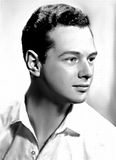


4 Comments:
Yes!!! I knew you could do it! Well, done,well done,luv!
Hello,
I have a inquiry for the webmaster/admin here at www.blogger.com.
Can I use some of the information from your post right above if I provide a link back to this site?
Thanks,
William
Anonymous William, I am sorry, but I have not been checking my blog for months and your comment was in Blogger's spam folder for some reason, so I didn't get notification of its existence.
If you're still there, then there's no reason why not ~ but you've got to also credit whatever source I credited, too. :)
christine~
Hi,
Thanks for sharing the link - but unfortunately it seems to be down? Does anybody here at eppylover.blogspot.com have a mirror or another source?
Cheers,
Harry
Post a Comment
<< Home